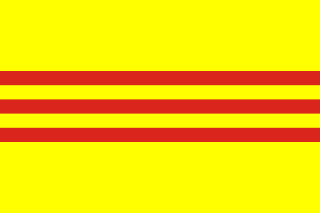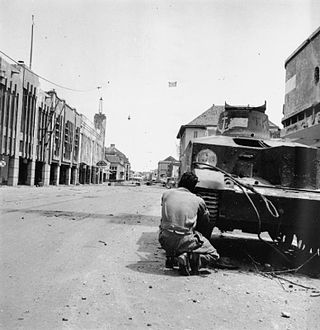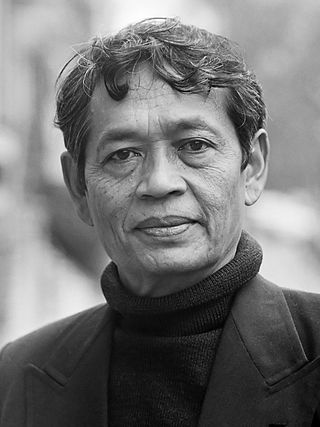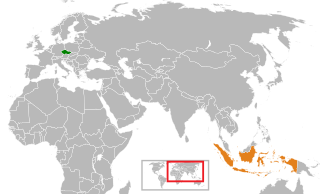
Surabaya is the capital city of East Java province and the second-largest city in Indonesia, after Jakarta. Located on the northeastern corner of Java island, on the Madura Strait, it is one of the earliest port cities in Southeast Asia. According to the National Development Planning Agency, Surabaya is one of the four main central cities of Indonesia, alongside Jakarta, Medan, and Makassar. The city had a population of 2,874,314 within its city limits at the 2020 census. With 3,009,286 people living in the city as of mid 2023 and over 10 million in the extended Surabaya metropolitan area, according to the latest official estimate, Surabaya was the second-largest metropolitan area in Indonesia. Surabaya metropolitan is also ASEAN's 6th largest economy ahead of Hanoi. In 2023, the city's GRP PPP was estimated at US$150.294 billion.

The flag of South Vietnam was first introduced by the Provisional Central Government of Vietnam, later served as the national flag of the State of Vietnam, and its successor, the Republic of Vietnam from 1948 to 1975 until the fall of Saigon. The design consists of a yellow background with three red horizontal stripes through the middle. It is used to represent the "Vietnamese Heritage and Freedom Flag".
Anthony Reid is a New Zealand-born historian of Southeast Asia. His doctoral work at Cambridge University examined the contest for power in northern Sumatra, Indonesia in the late 19th century, and he extended this study into a book The Blood of the People on the national and social revolutions in that region 1945–49. He is most well known for his two volume book "Southeast Asia in the Age of Commerce", developed during his time at the Research School of Pacific Studies, Australian National University in Canberra. His later work includes a return to Sumatra where he explored the historical basis for the separate identity of Aceh; interests in nationalism, Chinese diaspora and economic history, and latterly the relation between geology and deep history.

The Battle of Surabaya was a major battle in the Indonesian National Revolution fought between regular infantry and militia of the Indonesian nationalist movement and British and British Indian troops against the re-imposition of Dutch colonial rule. The peak of the battle was in November 1945. The battle was the largest single battle of the revolution and became a national symbol of Indonesian resistance. Considered a heroic effort by Indonesians, the battle helped galvanise Indonesian and international support for Indonesian independence. 10 November is celebrated annually as Heroes' Day.

Kate Webb was a New Zealand-born Australian war correspondent for UPI and Agence France-Presse. She earned a reputation for dogged and fearless reporting throughout the Vietnam War, and at one point she was held prisoner for weeks by North Vietnamese troops. After the war, she continued to report from global hotspots including Iraq during the Gulf War.

Ide Anak Agung Gde Agung, alternatively spelled too as Ida Anak Agung Gde Agung, was an Indonesian ethnic-Balinese politician, historian, and National Hero, who was the Raja of Gianyar, Bali, and served as the prime minister of the State of East Indonesia from 1947 to 1949, and the Foreign Affairs Minister of Indonesia from 1955 until 1956.

Mochtar Lubis was an Indonesian journalist and novelist who co-founded Indonesia Raya and monthly literary magazine Horison. His novel Senja di Jakarta was the first Indonesian novel to be translated into English. He was a critic of Sukarno and was imprisoned by him, as well as by Suharto on several later occasions. He held strong anti-leftist views and was seen by critics as aligned with military and pro-US forces that were opposed to Sukarno’s non-aligned policies, a charge that he himself denied.

Totok is an Indonesian term of Javanese origin, used in Indonesia to refer to recent migrants of Arab, Chinese, or European origins. In the eighteenth and nineteenth centuries it was popularised among colonists in Batavia, who initially coined the term to describe the foreign born and new immigrants of "pure blood" – as opposed to people of mixed indigenous and foreign descent, such as the Peranakan Arabs, Chinese or Europeans.
The Sorrow of War is a 1991 novel by the Vietnamese writer Bảo Ninh. The novel was Ninh's graduation project at the Nguyen Du Writing School in Hanoi. It tells the story of a soldier who is collecting dead bodies after the war and then begins to think about his past. The novel won the Independent Foreign Fiction Prize.

Air Commodore Iswahyudi was an Indonesian airman and National Hero. On 14 December 1947, the plane he was flying with Halim Perdanakusuma crashed off the coast of Tanjung Hantu Hill, Perak, Malayan Union. Halim's body was later found, but Iswahyudi's was never recovered.
Harry Aveling is an Australian scholar, translator and teacher. He specialises in Indonesian and Malaysian literature, and Translation Studies. He received the degrees of Doctor of Philosophy in Malay Studies from the National University of Singapore and Doctor of Creative Arts (DCA) from the University of Technology, Sydney. Besides his academic writing, he has translated extensively from Indonesian and Malay, from Vietnamese Francophone literature, and also co-translated from Hindi. He has been awarded the Anugerah Pengembangan Sastra for his translation work. Aveling has two sons, a daughter and five granddaughters.

Indonesia and Vietnam established diplomatic relations in 1955. Indonesia has an embassy in Hanoi and a consulate general in Ho Chi Minh City while Vietnam has an embassy in Jakarta. Both are neighboring nations that have a maritime border which lies on the South China Sea and are members of ASEAN and APEC.

The Czech Republic and the Republic of Indonesia established diplomatic relations in 1950. Both nations have agreed to forge ties to deepen relations, especially in the business and trade sector. Indonesia has an embassy in Prague, while the Czech Republic has an embassy in Jakarta that is also accredited to Brunei, Timor Leste and ASEAN.

Oetarjo Anwar Tjokroaminoto was an Indonesian politician and journalist. He served as Minister of Social Affairs for a year in the Wilopo Cabinet and was the Prime Minister of Pasundan for less than a month during January 1950.

Siswo Pramono is an Indonesian diplomat who is currently the ambassador for the Republic of Indonesia to Australia, posted in Canberra. During his posting, he is also serving as Indonesian Ambassador to the Republic of Vanuatu.

Darmawan Mangunkusumo was an Indonesian economist and engineer who served as the Minister of Welfare between 1945 and 1946, within the First and Second Sjahrir Cabinets. Before his ministerial tenure, he worked as a government economic official in the Dutch and Japanese colonial governments, and was part of the Indonesian nationalist movement since his studies in the Netherlands through Perhimpoenan Indonesia.
2010: Australian Broadcasting Commission, Late Night Live interview, Adams, Philip: Sorrow of War ranked in Best 50 Translations 20th Century 2011: Sunday Times Perth Now link 14/11/11 Palmos honoured, author Surabaya 1945, Heroes Day, 10 November, Indonesia. 1971: Winston Churchill Fellowship Trust, Fellowships List (Victoria).
Regional interest publications: 1966: New Guinea and Australia and the Pacific and South East Asia, Quarterly September–October, 'West Irian Visit: Kami merasa diasingkan' 1968: Reader's Digest Spring Edition, First Person Story Award, Vietnam War 1989: Harper's Bazaar, Spring Edition, 'Lucy', Short Story, Reflections on Pol Pot Era, Cambodia. Biography Sketch 'Years of Living Dangerously' by Jillian Coutts Skinner, Pages 194–197.












